Rick's b.log - 2015/01/01
You are 18.223.210.249, pleased to meet you!
Rick's b.log - 2015/01/01 |
|
| It is the 21st of November 2024 You are 18.223.210.249, pleased to meet you! |
|
mailto: blog -at- heyrick -dot- eu
If you have a RaspberryPi and you have installed one of the official RISC OS images, you will have the !Store application already installed. If not, you can get a copy here.
The !Store welcome window will appear:
Click on Catalogue and the list of available files will open. Like any app store, some are free and some are not. Look for Hearsay in the list.
Double-click the Hearsay line and information will open on the app.
Click on the "Get" button and wait while the application downloads. When it is complete, the archive will be opened for you.
Leaving the archive open, click on the filer icon for your filesystem (probably the SD card icon) to open $.
This, Boot Resources, is where various system resources live. Drag !SerialDev from the Hearsay archive to Boot Resources.
Double-click on !SerialDev so the system knows immediately where it is.
Open $ then the Apps directory (that's $.Apps, not the Apps device). Drag the !Hearsay application into this location.
Double-click on the !Hearsay that you just installed in Apps. (you can quit !Store now, unless you want to look around and see what else sounds interesting)
In common with many RISC OS applications, nothing will appear to have happened. Actually, it did. The Hearsay icon has been placed on the iconbar, like this:
So, with that in mind, click on the Hearsay icon. The terminal window will appear.
It is an ANSI terminal and Hearsay itself has been set up to act as a telnet client. If you only want to access telnet hosts, you do not need to configure anything. It'll work right out of the box.
Back when I was young, full of energy, blah de blah, the Acorn BBS scene was vibrant. The Digital Databank, Chaos, The World Of Cryton, Arctic, Arcade, and various other puns of Archimedes, ARM, RISC, or Acorn.
Most of the BBS systems died out with the birth of the Internet as a general purpose commodity. It wasn't until 1997-1998 that the Internet became something that anybody could access. Prior to that, you either used a portal on custom services (such as CompuServe) or you tore your hair out trying to get packages such as ka9q to work. Dial-up BBSs were dead easy. Give your modem the phone number, let it dial, connect, and there was an terminal that you could use to interact with the service.
But one has remained.
Arcade.
So this is the address that we need -
After a few moments, Arcade will answer. Notice that the software was built in 1995, twenty years ago. It would be nice to be able to recompile it to work on a RaspberryPi, but it doesn't look as if this is to be. Oh well. Let's hope Dave & David's RiscPC keeps on going for a good long while.
If you were in the scene from way back, maybe you can remember your password? Otherwise, enter NEW to sign in as a new user.
Once you have passed the login stuff, you'll see some messages and then Arcade's main menu will appear:
What's the benefit of an old BBS with files over a decade out of date? Simple. PRIVACY. Google has not figured out how to index content on a BBS, and it is likely to have to have custom procedures for each one, so it just won't happen. This means there is a place where you can talk to other people, be yourself, and the tentacles of Google, of Facebook, and of a dozen hidden advert-site profilers will not be able to touch you. Consider this the nice version of the Dark Net, where you don't need to worry about your every thought being indexed and correlated. And, best of all, everything is distilled down to plain straightforward text. So you can't share your drunken new years photos even if you wanted to...
If you want to go a little bit further with Hearsay, you'll need the user guide. Just so happens that I scanned the entire thing this very afternoon. In the spirit of BBS services, I will provide you not with a link, but with the message I posted to David Pilling.
Hearsay and Arcade
To start the new year, I scanned the Hearsay II User Guide, kindly sent to me by David Pilling. The reason for this is that his Hearsay 2 communications software is now available, for free, on PlingStore and is the perfect accompaniment to the RaspberryPi (or a Beagle etc) for accessing bulletin board systems. That said, it is a powerful and complex piece of software for which there was no available user guide...until now.
Click on the Apps icon, then double-click on !Store (icon looks a bit like a shopping bag).
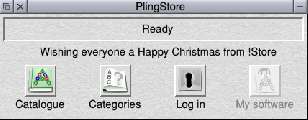
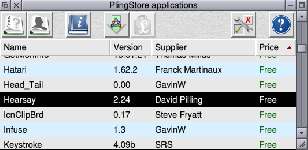
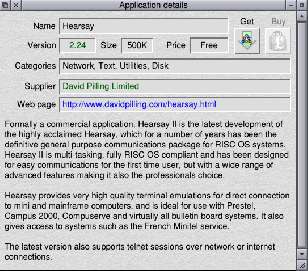

Hold down Shift and double-click on !Boot.
Double-click on Resources.
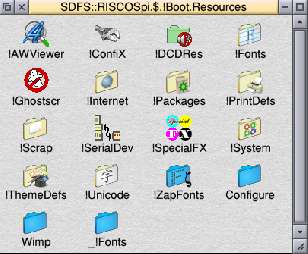
You can close Boot Resources now.
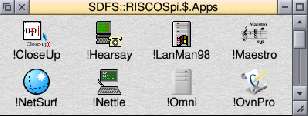
![]()
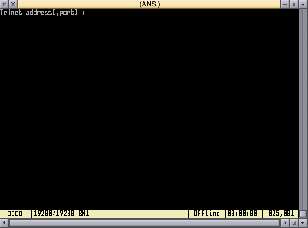
Indeed, at the time I even set up my own BBS. Here's a screenshot of my BBS Encina (Spanish for a type of Oak (as in Acorn, yeah?)) as it was in nineteen years ago, in 1996:
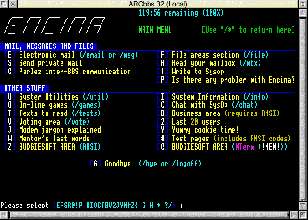
The problem was, BBSs were not connected. They had Fidonet to pass messages between servers, but if you wanted to upload a new program to five services, you had to make five phone calls. Being classed as a normal phone call, this could work out to be quite pricey. You also couldn't juggle activities. If you were downloading, you couldn't chat or read messages.
Along came the internet, with many benefits - local rate calls, multiple activities at one time, and any service that existed was available to you regardless of what country it was in. This brought many BBSs to a crashing halt.
arcade.demon.co.uk - enter that into the terminal prompt.
![]()
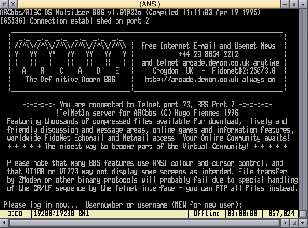
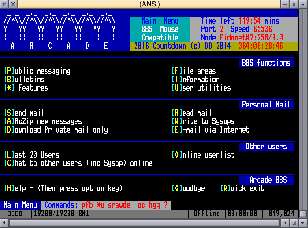
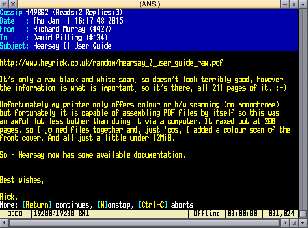
Rick, 13th February 2016, 21:55 Rick, 24th November 2016, 21:30
So you'll find Arcade at arcade-bbs.net
Heini, 7th February 2023, 16:11
My English is bad. I will Sysop be in Future. Open Riscos I have installed. And then Fido connected..
| © 2015 Rick Murray |
This web page is licenced for your personal, private, non-commercial use only. No automated processing by advertising systems is permitted. RIPA notice: No consent is given for interception of page transmission. |